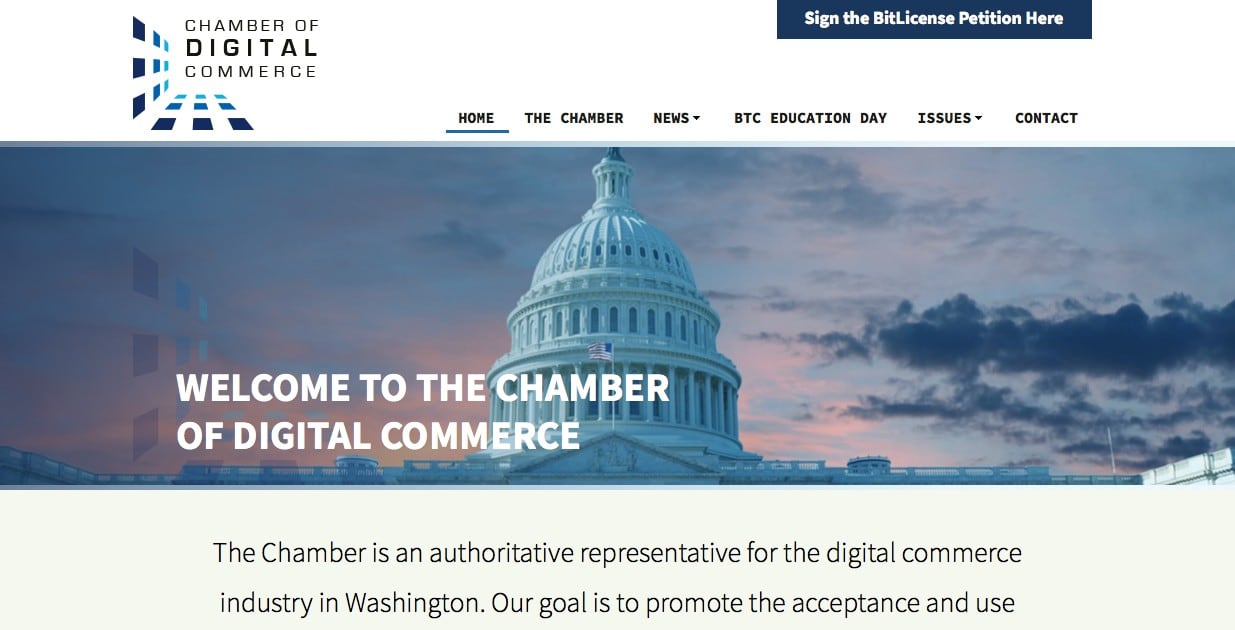
The Chamber of Digital Commerce (CDC), the first non-profit trade association and lobbyist group focused on bridging the gap between virtual currencies and lawmakers, sent their 10 page BitLicense critique Tuesday to Ben Lawsky and the New York Department of Financial Services (NYDFS).
“We have been very vocal in encouraging the industry to submit comments to the NYDFS. The Digital Chamber’s comments are posted on our website and the industry is welcome to use them as a resource,” said Perianne Boring, president of the Chamber of Digital Commerce.
The letter is separated into four main categories:
1. BitLicense regulations should not apply to businesses that store or transmit virtual currency and do nothing else;
2. Virtual currency businesses should have the freedom to invest;
3. Virtual currency businesses should have the freedom to innovate;
4. The “Existing Exchange Services” exemption discriminates against non-New York City persons.
The overall response to BitLicense represents a defining moment of solidarity by the Bitcoin community in response to the heavy-handed and innovation-destroying regulatory proposals — the community’s first true test in what is sure to be a more extensive battle to maintain Bitcoin’s autonomy.
Earlier in August, a BitLicense critique was sent by the Bitcoin Foundation and a separate petition signed by over 400 Bitcoin leaders and enthusiasts was also sent. The CDC is also currently distributing a community petition asking the NYDFS to extend the comment period past the September 1 deadline.
The CDC letter begins by urging the NYDFS to “reconstruct the definitions of ‘virtual currencies’ and ‘virtual currency business activities’,” in order to avoid committing an “egregious act of regulatory overreach.”
In addition to asking that regulators use existing legal frameworks when possible, the letter encourages the establishment of “safe haven provisions” for start-ups and the removal of provisions which hinder innovation without justification.
The CDC states that further educational efforts from industry leaders are necessary in order to pinpoint which regulations would be beneficial to society and which could cause social and economic damage.
“While further hearings would very much be in order, a more collegial approach in educating your office would prove of great value,” says the letter. “The Chamber would be honored to help facilitate that.”
According the CDC, BitLicense should not apply to businesses that simply store or transmit virtual currency and do nothing else, like a virtual currency wallet, suggesting that they are not principally different from data storage providers such as DropBox or Google.
The goal of the BitLicense proposal is to protect consumers and prevent fraud, but as the CDC letter notes, regulating businesses that simply store or transmit virtual currencies and don’t actually perform exchanges from fiat to virtual currency, is a waste of time and money.
“Criminals have no need to expose themselves to businesses that offer only virtual currency storage and transmission because these tasks are feasible with personal computers. Regulation of such businesses will be costly and futile, and valuable resources of your office will be spent on them monitoring of the least risky group of users.”
The CDC then makes the point that the virtual currency industry is already regulating itself effectively with security features such as multi-sig addresses. “This market-driven solution is far superior to what regulation can achieve.” They also make the point that businesses that merely store or transmit virtual currency “are often the most creative in the industry because they tend to explore the non-financial uses of block chain technology.” Regulating these businesses would severely stifle innovation in New York by forcing smaller businesses to seeks asylum in more welcoming markets.
Who would have thought that an unregulated market could actually self-regulate?! It seems this sort of community driven regulation is quite unsettling for lawmakers such as Lawsky, whose job security relies on his ability to enforce regulations upon markets.
But that’s what Bitcoin is: a perfect example of how self-regulation in the financial and monetary services industries can actually work. Of course, this is only possible due to the inherently open-source and decentralized nature of Bitcoin. Don’t expect non-transparent organizations like JP Morgan to act in the same manner.
One particularly interesting request made by the CDC is that the BitLicense should exempt small businesses with total assets below a specific amount, pointing to a N.Y. law which requires the NYDFS to utilize “approaches that will accomplish the objectives of the applicable statues while minimizing any adverse economic impact on the rule of small businesses.”
“The New York Financial Services Law further requires the NYDFS to foster the growth of the financial industry in New York through ‘judicious’ regulation,” says the letter, adding, “Unfortunately, the BitLicense proposal is by no means judicious.”
Seems like Lawsky is legally required to accommodate small businesses.
The CDC concludes their letter by again stating that self-imposed regulations will be not only more effective than anything proposed by the NYDFS, but more cost efficient as well.
“The NYDFS should allow the industry to self-regulate [with public ledger-empowered solutions] and other superior technological solutions instead of forcing archaic rules that do not work for tradtional financial financial institutions and will not work for virtual currency businesses.
Lawsky is then reminded of his first-hand knowledge of the fact that heavy-handed regulation will push businesses and money out of New York, and will force virtual currency businesses to turn away New York customers.
“No rational business will choose the BitLicense jurisdiction if it entails foregoing the rights to innovate and invest, permits the NYDFS to micro-manage its products, and exhausts valuable attention and capital on heavy compliance overhead.”
Check and mate, Lawsky.







